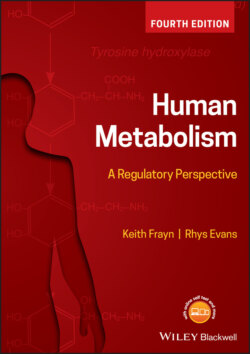Читать книгу Human Metabolism - Keith N. Frayn - Страница 18
1.2.1.3 Reduction-oxidation
ОглавлениеMetabolic energy in living cells is released by the oxidation of relatively large molecular weight substrates containing substantial amounts of chemically available energy (Gibbs ‘free’ energy, G). This is a form of combustion: energy-rich carbon-containing fuel (metabolic substrate) is ‘burnt’ using oxygen, producing water (H2O) and carbon dioxide (CO2) as waste products, in the same way as carbon-based domestic fuel (coal, wood) is burnt on a fire using atmospheric oxygen, and releasing its contained energy, with the same end-products. Clearly in metabolism there is no flame, but that is because the gradual release of the energy is controlled so stringently and incrementally.
The term ‘oxidation’ originally referred to the gain of oxygen in a chemical reaction, and the opposite process, ‘reduction,’ to the loss of oxygen (e.g. when metal oxides are heated, they are ‘reduced’ to pure metal, with the loss of oxygen and a reduction in the weight of the ore). However, these terms have now been broadened to encapsulate the general principle of these types of reaction – i.e. the transfer of electrons. Oxidation can be thought of as the process of losing electrons, and reduction as gaining electrons (in an analogous fashion to regarding acids as proton (H+) donors and bases as proton acceptors). Implicit in gaining an electron is gaining energy, hence reduction actually involves achieving an enhanced energy status. This may sound counter-intuitive as the word ‘reduction’ implies diminution, but if one considers that chemically it refers to gaining a negatively charged entity (an electron, e−) then this aids understanding. Oxidation and reduction occur simultaneously in a reaction as an electron is transferred, and these reactions are therefore called redox reactions. Following on from this, oxidising agents are substances that are relatively electron poor and can gain electrons (indeed, they attract electrons) causing oxidation (electron loss) in another substance, but becoming themselves reduced, becoming electron- enriched. The partner substance, a reducing agent, is electron- (and hence energy-) rich and donates an electron (to the electron acceptor – the oxidising agent) and hence reduces it, becoming itself oxidised: see Box 1.2.
